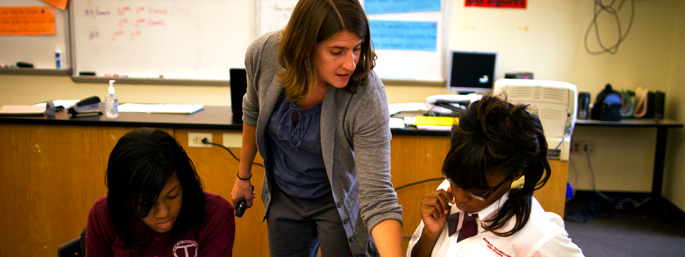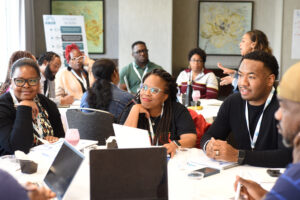New research is showing that IMPACT, the innovative teacher evaluation, development and compensation system in Washington, D,C,, is having positive effects on student and teacher performance in the district.
What’s it like to work in this system? We spoke with Shira Fishman, an exceptional math teacher at McKinley Technology High School in DC Public Schools for whom TNTP’s Fishman Prize is named, to hear about her and her colleagues’ experiences.
One of the goals of IMPACT is to help teachers get more feedback and develop their craft. Has that happened for you and your colleagues?
 I’ve taught for 10 years now in DCPS, and when I was in my first few years, I did not get very much feedback at all. So now we do, and I think I’ve become a better teacher over the last few years because of it.
I’ve taught for 10 years now in DCPS, and when I was in my first few years, I did not get very much feedback at all. So now we do, and I think I’ve become a better teacher over the last few years because of it.
We get more observations, and what we hear afterwards is much more thorough. There’s a set amount of time that can’t pass before you have your post-conference, where you get concrete strategies to improve on what the observer saw.
Most teachers appreciate it, though there are some people that just don’t take constructive criticism well. I think that the folks who really want to improve take it seriously and try to implement some of the suggestions. Of course, for some, it’s in one ear and out the other.
For me, the best part of the whole IMPACT process is having master educators in my school—they genuinely want to help and give feedback. It’s so nice to have somebody in your content area, an expert, doing that. For example, I was doing a stations activity, and while it went well, the master educator who observed me suggested that I include an error-analysis problem, so instead of my students just solving problems, occasionally the stations would include a problem with a wrong solution that the students would have to fix. I’ve worked that in, and it’s been a good addition.
What did you think of IMPACT when it was first introduced?
In general, IMPACT is definitely better than I originally thought it was going to be. It seemed really overwhelming at first, with a very detailed and specific rubric, and a lot at stake.
So my solution was to make it less overwhelming. I don’t spend much time pouring over the rubric and trying to memorize it and fit my lesson into boxes. I concentrate on in general, what are the components of a good lesson or classroom experience, but I don’t really get bogged down into specifics on the rubric. Maybe that’s not the best advice for everybody, but for me, the thing that’s made it more manageable: to worry less on the rubric itself and focus on my class and the things I can do and just be really open to feedback that I get.
I think for new teachers, it’s different—I would have really liked the rubric my first year! It’s a great tool to have. But I still wouldn’t want a new teacher, while they are teaching, to be thinking constantly about checking every box. You can think about that when you’re creating your lesson, but not when you execute.
People get so worried about meeting requirements on a rubric, but they are not going with the flow. Things happen that you can’t plan on and you have to be able to adjust during the course of a class period. And we’re all individuals, too: a “four” could look very different in two different teachers’ classrooms. There is that flexibility—you can still be yourself and do lessons the way that works for you and your kids and can still meet the requirements. Granted, I have had good experiences, but I do get pretty consistent scores and feedback. I know there is a lot of time and effort spent upfront to norm observers, which I think has paid off.
How could IMPACT be better?
I do see one component that’s missing: student voices. I would like to see student surveys or some way that students’ opinions can be factored in. Kids, especially teenagers, are the most honest people in the world. They can give you a good snapshot of what they are learning and how they are responding to a teacher.
How would you describe your overall experience with IMPACT?
My experience has been positive. There’s no doubt about it: it is nice to get good scores and to get bonuses. And it is nice to get recognition and feel that your hard work has been validated.
What about colleagues who haven’t had as positive an experience with IMPACT? What do you hear from them?
I don’t think that across the board people have as many positive things to say about IMPACT as I do. There’s no way around it: it is stressful, it produces a lot of anxiety and when people aren’t happy with their scores, they feel that they are being judged and that things aren’t fair. I’ve been teaching for 10 years and it’s still nerve-wracking when someone I don’t know observes me.
However, I would say that probably anyone would agree that IMPACT has made everybody step up their game. The knowledge that someone could at any moment observe your class—everybody at my school is aware of that, and I feel that our teaching has definitely improved. People are more thoughtful about little things on the rubric, like having checks for understanding and differentiating instruction. Just knowing that that’s a box on the rubric is powerful. I feel like I see a lot more planning and more interesting lessons happening because people know that someone could be coming in at any time.
I wish that everybody felt as positively about IMPACT as I do. I don’t know that there’s a solution for the fact that it causes a lot of anxiety and, not friction, but a sense of frustration from people who are frustrated with their ratings. I hate when people are down on themselves. I just wish it could be done without stress and heartache. But if people are consistently scoring low, this probably isn’t the career for them. So that is probably a good thing, even though it makes me feel bad.







